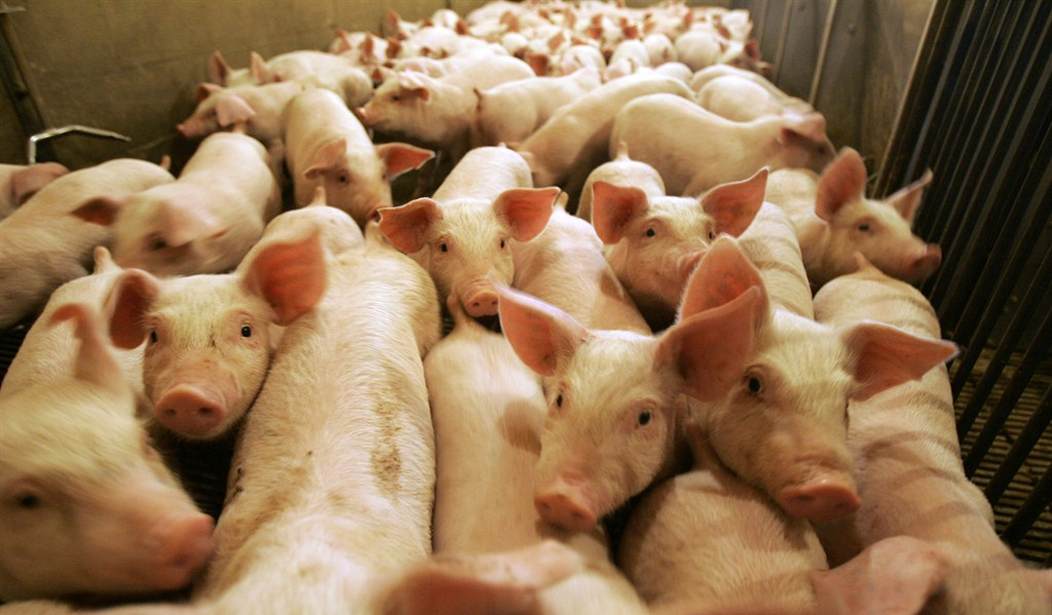Members of the media are bemoaning the “baby pig” abortions that are happening because of the coronavirus’ impact on the meat industry – as they should. But in their coverage, they’re missing a broader point: If we can mourn animals aborted because they’re unwanted, how much more so should we mourn aborted human beings destroyed for the same reason?
On April 27, Reuters published a story with the headline reading, “Piglets aborted, chickens gassed as pandemic slams meat sector.” Following their lead, other media, along with animal-rights activists, drew attention to the same issue. In their coverage, Reuters writers called the aborted animals “piglets” and “baby pigs” – a courtesy that their outlet advises against when writing about aborted human beings.
As pro-life group Live Action pointed out in a tweet on April 28, Reuters “forbids journalists from acknowledging the humanity or victimhood of human children targeted for abortion,” and yet, “fetal pigs are ‘baby pigs,’ ‘piglets’ and ‘victims.’”
They were referencing Reuters' style guide or “Handbook of Journalism.”
“Unless quoting someone, refer to aborted foetuses rather than unborn babies,” the handbook reads under “abortion.”
Even with the discrepancy, Live Action criticized, Reuters “prides itself in its supposed ‘Freedom from Bias.’”
The Reuters story, written by agriculture/food reporter Tom Polansek and agriculture reporter P.J. Huffstutter, detailed the pandemic’s impact on animal farmers. They began by describing the plight of Iowa farmer Al Van Beek, who “had nowhere to ship his full-grown pigs to make room for the 7,500 piglets he expected from his breeding operation.”
The decision he had to make “still troubles him,” Polansek and Huffstutter wrote – the decision to ask employees to “give injections to the pregnant sows, one by one, that would cause them to abort their baby pigs.”
Recommended
There is a more technical term for a pig that has not yet been born: fetal pig. But the Reuters reporters did not use it.
“Van Beek’s piglets,” the reporters continued, “are victims of a sprawling food-industry crisis that began with the mass closure of restaurants.”
They didn’t hesitate to use the word “killing” in their story either.
“Farmers take pride in the fact that their crops and animals are meant to feed people, especially in a crisis that has idled millions of workers and forced many to rely on food banks,” Polansek and Huffstutter wrote. “Now, they’re destroying crops and killing animals for no purpose.”
Following the Reuters report, other news outlets picked up on the story.
“Farmers kill piglets, give sows abortions as coronavirus slams meat industry,” a New York Post headline read on April 27. Another, on April 29 announced, “Animal activists blame meat industry oversupply for euthanized piglets, abortions.”
While the New York Post didn’t specify what was aborted, others did, such as Newsweek.
“The closures of slaughterhouses have caused huge problems for pig farmers,” editor Brendan Cole wrote in a story published on April 28. Without enough room and with the decreased demand, farmers are forced “to cull the hogs and piglets or even give pregnant sows injections, causing them to abort their baby pigs.”
CNBC and Yahoo! News also picked up the Reuters story and published it on their respective sites.
On Twitter, other members of the media chimed in.
“Details are disturbing,” Canadian reporter Natasha Fatah said of the Reuters story in an April 27 tweet. Stassy Olmos, a news reporter for a Tennessee ABC affiliate, exclaimed, “SO SAD!” in a tweet on April 29.
Activists also called attention to the issue.
Animal-rights activist Ari Solomon tweeted on April 28, “Tired of reading about farmers forcing mother pigs to have abortions? Chickens being gassed to death with CO2?” He added, “Well, there's good news. You do not have to support this horrendous industry.”
The Reuters story was a worthy one: It described the pandemic’s damage to the animal-farming industry – informing Americans of the consequences, and exposing larger issues in the meat sector. But its language revealed another media message: When it comes abortion, unborn animals can be humanized, while unborn children cannot.
For animals, their “babies” are aborted. For humans, it’s “foetuses.”
As living creatures, animals should be treated well – free from abuse and cruelty. The predicament of unborn baby animals understandably alarms the media and activists. But the predicament of unborn baby humans should too.
























Join the conversation as a VIP Member